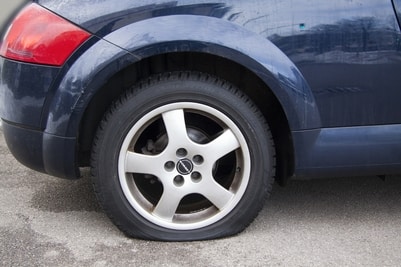How to identify a slow puncture
A slow puncture can result in serious issues if it is not quickly identified and repaired or replaced in a timely manner. Within this blog article, we are going to tell you how to identify a slow puncture and what to do if you think you have one.

What is a slow puncture?
A slow puncture causes air from the tyre to be released gradually over an extended period of time. You may not initially notice that you have a slow puncture due to the time taken for the tyre to deflate. It is important to check this, that you regularly check your tyres pressures. If you notice that your tyre pressures are continually dropping, then this may be the result of a slow puncture.
Unlike a normal tyre puncture, you may not be able to identify a slow puncture with the naked eye. You may potentially be able to hear a slight 'hissing' noise. Slow punctures can occur due to a multitude of different reasons. You may get a slow puncture due to a nail or small particles of glass piercing the tyre tread, or there could potentially be an issue with the tyre valve.
Can I drive with a slow puncture?
Driving with a slow puncture can result in serious issues and it is highly advised that if you have identified that you have a slow puncture, that you get this sorted as soon as possible. A slow puncture can result in the tyre becoming completely flat, lead to undue tyre wear or result in a complete tyre failure.
How do you find a slow puncture on a car?
On some cars, you may notice a TPMS warning light appear on your dashboard. This TPMS warning light relates to the Tyre Pressure Monitoring System. The TPMS warning light will notify you if one of your tyres' tyre pressure is low. If your car does not come equipped with TPMS, you need to ensure that you regularly check your tyre pressures.
This can be done easily at home with a tyre inflator. Tyre inflators range from around £15-20 online. Alternatively, your local National Tyres and Autocare branch will be able to check your tyre pressures completely free of charge. If you are worried that you may have a slow puncture, it would be a good idea to book in for a FREE visual safety check at National.
Related: Dashboard Warning Lights
Will a slow puncture fail an MOT?
A slow puncture can cause damage to the tyre sidewall and can result in serious issues. If this is identified during an MOT, you will, unfortunately, fail your MOT Check. If you need a new tyre, our National branch will be able to fit a new tyre for you on the day (depending on tyre availability).
It is important to note that if your car has suffered a puncture and you have replaced your tyre with a spare tyre or space-saver tyre, this will need to be changed before your MOT is due.
Can a slow puncture cause a blowout?
Yes, a slow puncture can cause a tyre blowout. Slow punctures can weaken the tyre sidewall, which will reduce the amount of control you have while driving. If the slow puncture causes a tyre blowout, this will result in a complete loss of control and can result in catastrophic circumstances. This emphasises the importance of regular tyre maintenance.
Can tyres lose pressure without a puncture?
Yes, tyres can lose pressure without a puncture. A faulty tyre valve can cause tyres to lose pressure. Our highly trained National branch staff will be able to conduct a free tyre safety check, giving you peace of mind that your car is safe to drive.
It is vitally important that if you think you have a slow puncture, DON'T just ignore it.
Can you repair a slow puncture?
A tyre can only be repaired if it is a small puncture (less than 6mm in diameter) in the central ¾ of the tyre, anywhere else is deemed unsafe as it is too close to the sidewall.
If you are looking for new tyres, then you can purchase these online via National. No matter your budget, we will be able to find a tyre to suit your needs. Whether you are looking for premium, mid-range or budget tyres, these can be purchased online or direct at your local National branch. We also offer payment assist, giving you the option to spread the cost over a number of months.
What are the risks of dangerous tyres?
Every year, dangerous tyres lead to around 5,000 convictions, 900 casualties, and 160 deaths or serious injuries. Not only that, but illegal tyres can actually end up costing you more than the price of a new set: you could face fines of up to £2500 and 3 points on your licence per illegal tyre, not to mention that if you're found to have illegal tyres in an accident, it can invalidate your insurance.
A free tyre check from National can make sure your four wheels are ready for the road. Book in now to stay safe on your journeys.
Book a Free Tyre Check
Want to know more about looking after your tyres? Check out our online tyre safety hub.
Did you enjoy this blog post? |11 people found this review helpful



 Sign up for SPECIAL OFFERS
Sign up for SPECIAL OFFERS
